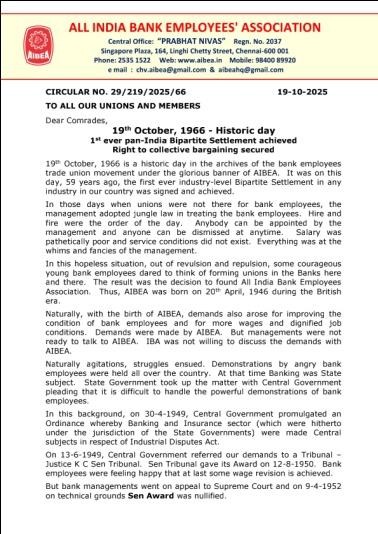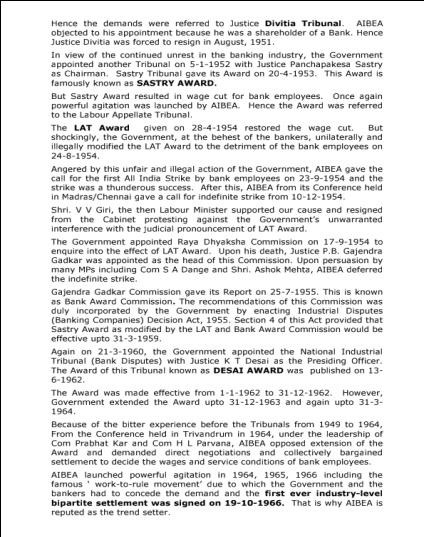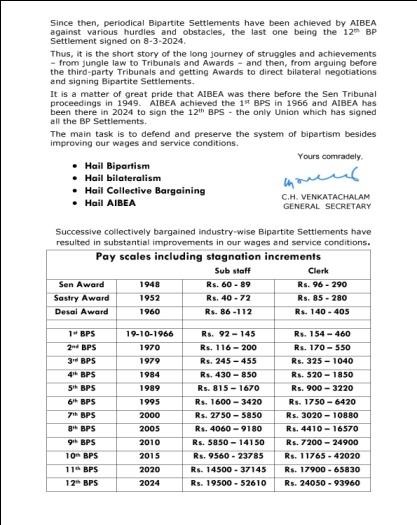The Historic Importance of 19th October 1966
This notification commemorates the historic first Bipartite Settlement of 1966, achieved by the All India Bank Employees’ Association (AIBEA), which secured collective bargaining rights for bank employees and transformed their wages and working conditions through decades of persistent struggle and negotiation.

Author: Meera
Published: October 24, 2025
19th October 1966 marks a historic date in the history of the banking sector in India. This is when the first-ever industry-level Bipartite Settlement (BPS) was signed, a pivotal moment achieved by the All India Bank Employees' Association (AIBEA). The achievement was crucial for securing the right to collective bargaining for bank employees, something that was previously unheard of in India’s banking industry.
Before this, bank employees faced very poor working conditions. Management treated employees harshly, with hiring and firing being arbitrary, and wages being insufficient. Conditions for the workers were similar to 'jungle law,' where employees could be dismissed at any time without just cause, and their wages were extremely low.
Formation of AIBEA
In response to these oppressive conditions, a group of young bank employees dared to form the AIBEA in 1946, aiming to secure better rights, wages, and working conditions for employees. The association’s formation came at a time when there were no unions in banks to represent the workers. AIBEA's founding was a significant response to these harsh conditions and a step towards improving the future of the employees in the banking industry.
Advertisement



Image-AIBEA Notification
Struggles and Negotiations
Despite the formation of AIBEA, managements were initially reluctant to engage with unions. The Indian Banks' Association (IBA) rejected discussions with AIBEA on improving conditions. This refusal led to protests and strikes. In 1949, the Central Government, under pressure, referred the matter to a tribunal led by Justice K.C. Sen, known as the Sen Award, which aimed to set new conditions for bank employees.
However, even after the award was granted, management fought back. They appealed to the Supreme Court and managed to have the Sen Award nullified in 1952. Despite these setbacks, AIBEA persisted and called for national strikes and agitations, demanding better treatment for employees.
The Sastry and Desai Awards
Over time, additional tribunals were set up to address the demands of bank employees. The Sastry Award (1953) and Desai Award (1962) followed, although neither brought lasting improvements. The Desai Award, for instance, led to wage increases, but these were still unsatisfactory in the eyes of AIBEA and its members.
The First Bipartite Settlement
After years of struggle, AIBEA succeeded in securing the First Bipartite Settlement (1st BPS) on 19th October 1966. This was a landmark achievement for the association and for Indian bank employees in general. For the first time, a collective bargaining agreement between the bank employees' union and the management (represented by the IBA) was signed, guaranteeing improved wages and service conditions for employees.
Further Struggles and Awards
Over the decades, AIBEA continued to fight for better conditions, with further bipartite settlements achieved in the years that followed. These included:
- 2nd BPS (1970)
- 3rd BPS (1979)
- 4th BPS (1984)
- 5th BPS (1989)
- 6th BPS (1995)
- 7th BPS (2000)
- 8th BPS (2005)
- 9th BPS (2010)
- 10th BPS (2015)
- 11th BPS (2020)
- 12th BPS (2024) (latest settlement)
Each settlement brought about significant wage improvements and better working conditions for bank employees. For example, the pay scales under the Sen Award (1948) were as low as ₹60-89 for sub-staff, whereas, after successive BPS agreements, the pay scales rose to ₹19,500 – ₹52,610 for sub-staff and ₹24,050 – ₹93,960 for clerks (12th BPS in 2024).
AIBEA’s Legacy
AIBEA’s success in securing these settlements has helped bring about substantial improvements in the wages and working conditions of bank employees across India. It is a matter of pride for the union, as it has remained at the forefront of advocating for the rights of workers in the banking industry.
AIBEA's journey has been a long one, starting from challenging and almost non-existent employee rights in the 1940s, to today, where the 12th BPS was successfully signed. The union’s ability to secure these settlements has come through its persistence and determination, coupled with its commitment to bipartite negotiation and collective bargaining.
Hail Bipartism and Collective Bargaining
AIBEA continues to celebrate its foundational principles, particularly bipartism (the cooperation between employers and employees), bilateralism, and collective bargaining. These principles have formed the backbone of AIBEA’s campaigns, leading to a better future for bank employees.
Advertisement
No comments yet.
